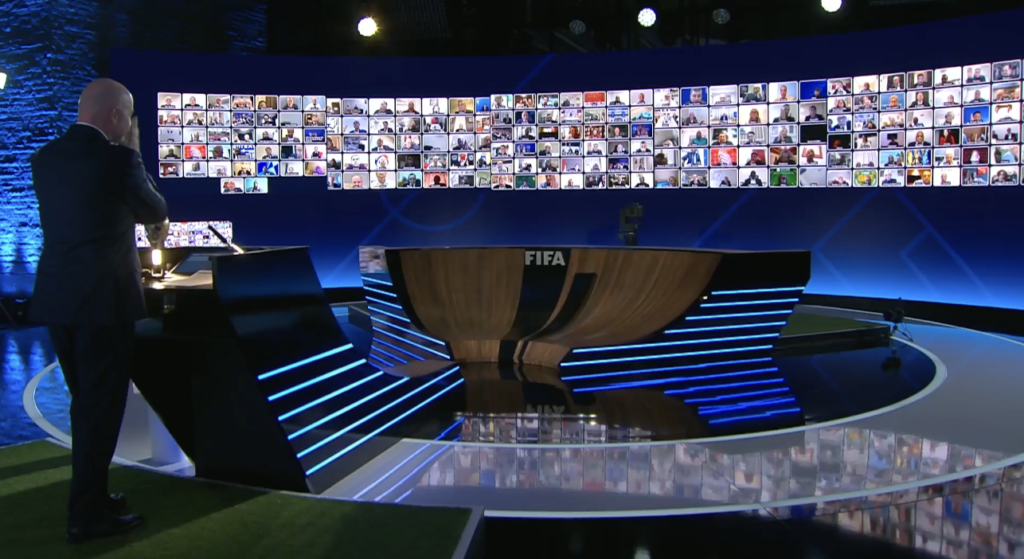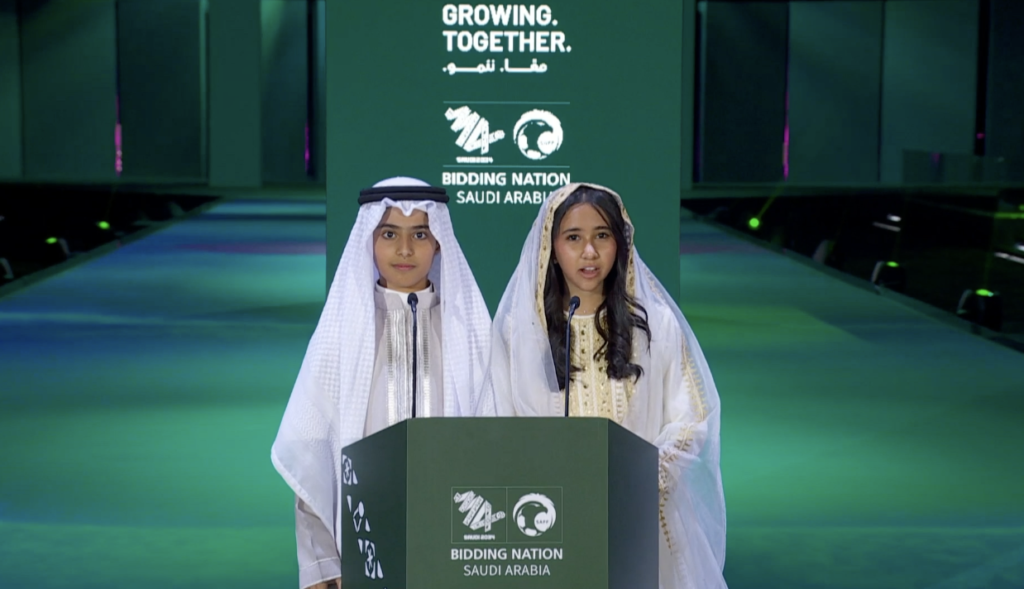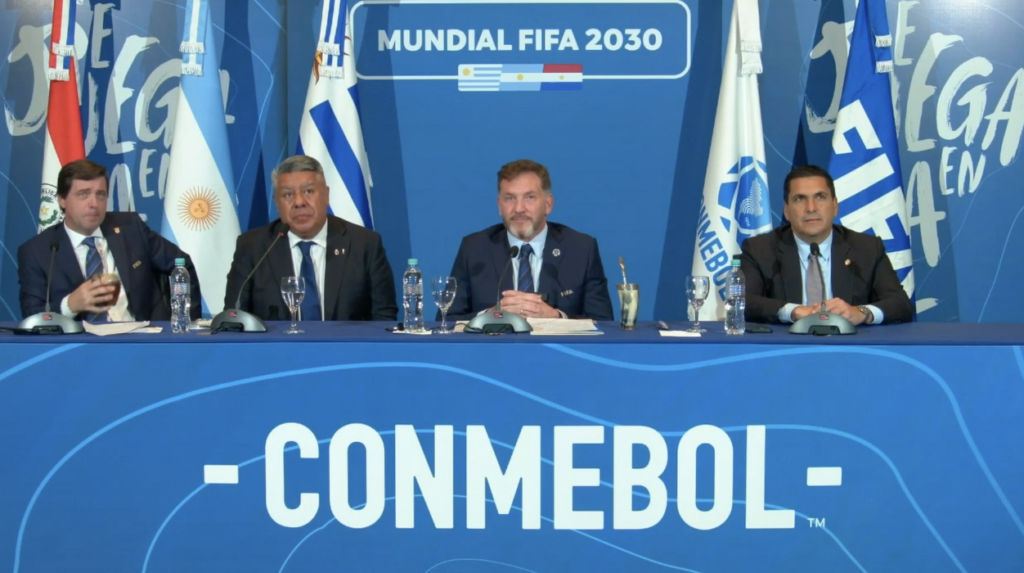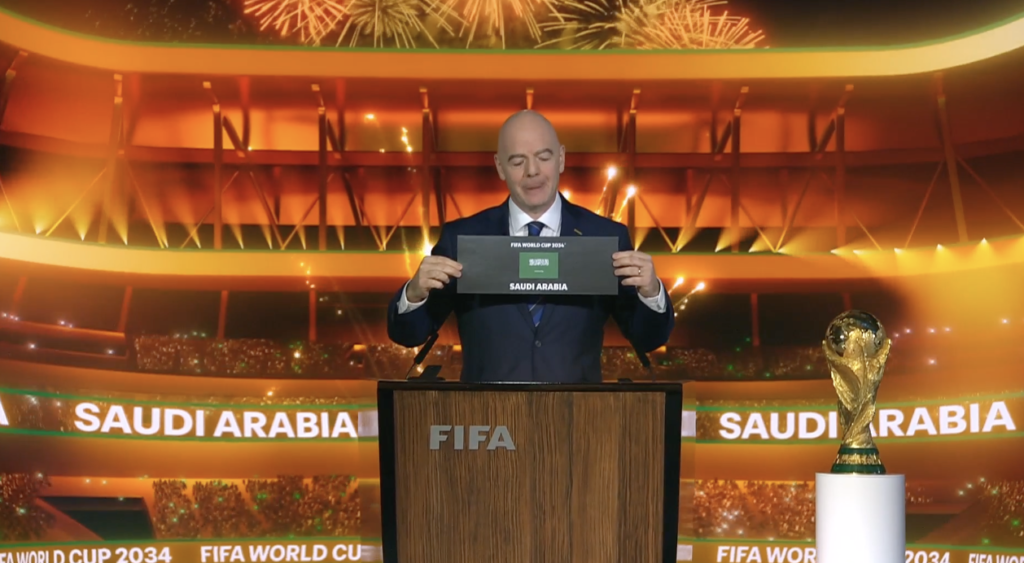December 11 – The formality is now reality. At a virtual meeting of FIFA member federations today and despite widespread human rights concerns, Saudi Arabia were officially granted 2034 World Cup host status by acclamation while 2030 went to six nations across three Continents in the most contentious and murky bidding process in recent history.
Just to recap for anyone who hasn’t followed the procedure, as expected the decisions were not put to the vote, FIFA’s online extraordinary Congress merely rubber-stamping by applause what had already been agreed many moons ago as a fait accompli. So much for democracy and drama.
Having failed time after time to land the World Cup, Morocco has at last got its wish and will line up alongside Spain and Portugal for 2030 with a game each in Argentina, Paraguay, and Uruguay to honour the centenary of the tournament first staged in 1930 in Uruguay.

The very concept of a three-continent competition defies logic as well as history and tradition and had it been the only World Cup on the table, the logistics of 2030 would surely have generated heated debate.
But although it is still 10 years away, it is the 2034 tournament that grabbed the attention, perhaps not in FIFA circles where the Saudis shared today’s occasion with the 2030 hosts but certainly round the world amid growing claims of shameless sportswashing. Along with fears for migrant workers building eight new stadiums in a spectacularly ambitious Saudi infrastructure build, these issues look set to dominate comment and cast a shadow over the World Cup for the next 10 years.

How Saudi Arabia was given the highest rating by FIFA’s evaluation panel of any bidding country in history is indeed bewildering, not only humanitarian grounds but also given the fact that a majority of the proposed stadiums have not even been built yet.
Let’s not forget that Saudi Arabia was fast-tracked into pole position as the only candidate by the FIFA hierarchy and the organisation’s entire membership were given little choice but to shrug its collective shoulders and go with Gianni Infantino’s flow – with a couple of exceptions. Norway argued that the bidding process “undermines good governance and reform” while Switzerland also raised governance concerns.
But with hardly anyone in the building apart from Infantino, his number two and a few the members of the FIFA administration, it mattered little, the whole staged caboozle being utterly surreal with Infantino leading the chorus of approval behind a podium at FIFA HQ (the one in Zurich) and entreating his “dear friends”, side by side on video link on a big screen, to show the watching world how united they were.

Following a series of lavish, high-tech presentations from the leaders of all the winning nations (or rather cherry-picked hosts), Infantino rounded off the proceedings, perhaps no bad thing for some of the hundreds of delegates across the globe for whom it must have been the middle of the night.
“I fully trust our hosts to deliver a FIFA World Cup that meets the world’s expectations. That is why we went through this bidding procedure and offered transparency,” Infantino brazenly declared having previously asked football’s member federations to clap their hands at head level to show their support at every opportunity. “The World Cup is unique and a unique catalyst for positive social change and unity.”
The cringingly back-slapping occasion completed an opaque 15-month bid process which Infantino helped to mastermind and, with no international media present, the FIFA president conveniently sidestepped any questions about human rights concerns, travel issues or indeed the merits of the bid process itself.

But Amnesty International, one of the leading dissenting voices against the Saudis hosting, was quick to respond.
No sooner had the announcement been made (without any mention, by the way, of the possibility of a second winter World Cup) than the organisation denounced FIFA’s decision to give the oil-rich kingdom and Crown Prince Mohammed bin Salman its biggest prize yet for massive spending on global sports as “a moment of great danger”.
“FIFA’s reckless decision to award the 2034 World Cup to Saudi Arabia without ensuring adequate human rights protections are in place will put many lives at risk,” declared Steve Cockburn, Amnesty International’s head of labour rights and sport.
You haven’t heard the last of it, that’s for sure.
Contact the writer of this story at moc.l1745645832labto1745645832ofdlr1745645832owedi1745645832sni@w1745645832ahsra1745645832w.wer1745645832dna1745645832

